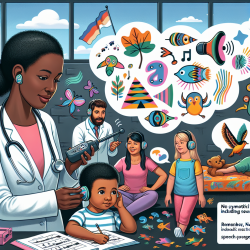Introduction
The COVID-19 pandemic has left an indelible mark on various aspects of life, with adolescent wellness being one of the most affected areas. As practitioners dedicated to improving outcomes for children, understanding the pandemic's impact and employing data-driven strategies is crucial. A recent study, "The impact of COVID-19 on adolescent wellness in Chicago," sheds light on how the initial remote schooling period affected adolescents' self-reported wellness. This blog explores the study's findings and offers actionable insights for practitioners to enhance their skills and support adolescent wellness.
Key Findings from the Study
The study, conducted by Ezeoke et al. (2022), involved 55 students who completed a 22-item wellness questionnaire before and shortly after the onset of the pandemic. The results revealed significant differences in three critical areas:
- Balance: The ability to maintain a balanced life was significantly impacted, with scores dropping from 7.3 pre-pandemic to 6.4 during the pandemic (p=0.02).
- Education: Students reported a decline in their educational experience, with scores decreasing from 8.4 to 7.7 (p=0.03).
- Friends: Social relationships suffered considerably, with scores plummeting from 8.0 to 6.3 (p=0.001).
These findings highlight the need for comprehensive support in these areas to promote adolescent wellness.
Strategies for Practitioners
As practitioners, leveraging these insights can guide the development of effective interventions. Here are some strategies to consider:
- Enhancing Balance: Encourage activities that promote physical, mental, and emotional well-being. Implement mindfulness practices and stress management techniques in therapy sessions to help students regain balance.
- Supporting Education: Collaborate with educators to create engaging and supportive learning environments. Utilize technology to provide personalized learning experiences and address individual needs.
- Fostering Social Relationships: Facilitate peer interactions through virtual group activities and social skills training. Encourage students to maintain connections with friends and family to strengthen their support networks.
The Importance of Data-Driven Decisions
Data-driven decision-making is essential in developing effective interventions. By analyzing data from studies like this, practitioners can identify trends, measure progress, and tailor strategies to meet the unique needs of each student. Incorporating evidence-based practices ensures that interventions are grounded in research and are more likely to yield positive outcomes.
Encouraging Further Research
The findings from this study underscore the importance of ongoing research in understanding and addressing the challenges faced by adolescents. Practitioners are encouraged to engage in continuous learning and contribute to the body of knowledge by conducting their research or collaborating with academic institutions.
Conclusion
The impact of the COVID-19 pandemic on adolescent wellness is profound, but with data-driven strategies and a commitment to continuous improvement, practitioners can make a significant difference. By focusing on balance, education, and social relationships, we can empower adolescents to thrive in a post-pandemic world.
To read the original research paper, please follow this link: The impact of COVID-19 on adolescent wellness in Chicago.










